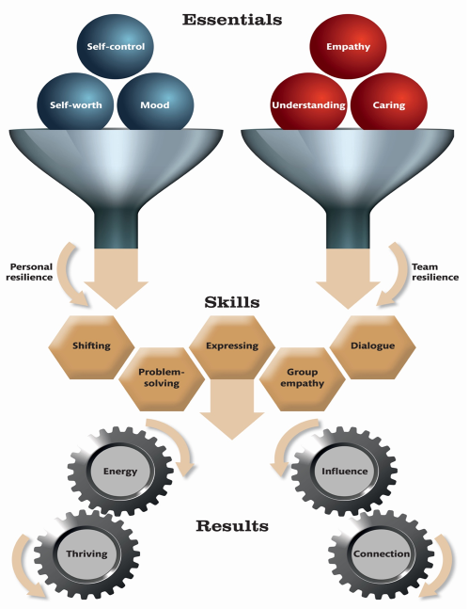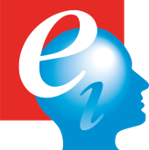How do we effectively lead on- and off-site teams across multiple locations? Remote working will remain in place for some, while others will return onsite. Most leaders led their first remote teams during the pandemic and now arrive at the opportunity to be prepared and equipped to engage online as we mindfully take on the complexities of hybrid working and learning. Leaders from around the globe convened with Ei World to share best practices on how to navigate multi-locational teams. We share here some of the key insights.

Ei World Point of View
- Build trust by being emotion conscious & paradox aware
- Anchor a positive team culture by co-creating norms
- Normalise mental health awareness and make self care a priority
Leadership has to Adapt to Virtual Working
Taking Ownership of Emotional Safety
Cultivating emotional safety and trust bridges the “virtual distance” and enables hybrid teams to be successful. Social and emotional cues we take for granted when working in-person are often difficult to interpret via screen. Hybrid and remote leaders are now called on for heightened tuning-in to colleagues and creating safe environments to speak up. This takes confidence with proactively checking in on how people are feeling and communicating to fill the “watercooler gap” – the informal but often important exchanges that lead not just to ideas but to awareness of how people are.
Actions you can take to increase your team’s trust
Support Expression: One team used the “mental health weather report” – describing how they are feeling in terms of “sunny”, “foggy” or “thunderstorms”, for example.
Plan and Review: Implement “bookend” meetings on Mondays and Fridays to set expectations and look back at how you have met them (or did not).
Demonstrate Vulnerability: Name your own emotions, experiences, and learnings, and acknowledge feelings you perceive or that are shared by the team.
Sustainable Interactivity: Offer clarity about when and how to contact you or expect you to be reachable – model healthy responsiveness and time out, with flexibility for emergencies.
Norm Empathy: Consciously prioritize some time and energy for listening to and acknowledging concerns, even if you have no immediate solution for their worries.
Agenda Item #1 – Check-in: Start remote meetings with a collective moment to check on how each one is feeling, the energy they bring and their state of mind.
Agenda-Free Meetings: Schedule meetings with no deliverable other than checking in and talking about anything that does not fit your typical agenda.
Build Optimism: Acknowledge realities, facts and challenges, charting a course to success, with solutions that embrace the team’s strengths and resources.
More than 20% of the workforce could work remotely 3 to 5 days a week as effectively as they would work from an office…
McKinsey & Company, 2021 Tweet
However, more than 50% of the workforce, has little or no opportunity for remote work. The opportunity for leaders is to expand their toolbox to meet the call of Hybrid Leadership. If you can lead a remote team effectively, you are better equipped for in-person leadership. We believe the same skills are used but with slightly different approaches. In-person leadership may focus on social functions, and a remote leadership focus will be on process and operations. Both approaches require proactivity in the elements that don’t occur naturally.
For example, remote leadership calls for engaging the social element that otherwise does not naturally occur. For the hybrid team, as is true for all teams, clear discussions on commitments and expectations, as well as time set aside for collaborative work are critical.
Let's compare
Unhealthy Habits of a Remote Team
- Lack of a daily routine
- Multi-tasking home & work priorities simultaneously
- Too much screen time
- Disconnecting from friends & family
- Not being ‘work ready’ (e.g. working from bed)
- Poor exercise/eating habits
Healthy Habits of a Remote Team
- Discussing anticipation and appreciation on Monday for the week
- Weekly Friday reflection on wins, learnings and weekend anticipation
- Individual check-ins during team projects
- 90-day cycles of OKRsfor team and individual goals, progress visible to all
- Encourage team members to calendar time for personal activities around their working day
What you can do Now to Model Excellent Self Care and Strong Mental Health
The secret to successful leadership is to first cultivate your own skills. A strong personal foundation enables you to better serve others and overcome challenges both independently and with your team. Self-care is the first step to success.
- Take time out for personal interests. Share your experiences with the team and invite your team to share theirs; e.g. what have they done over the weekends to nourish themselves and their families.
- Share your self-care practices and engage team members to share theirs.
- Model a consistent exercise routine, perhaps spend time in nature.
- Meditate or practice mindfulness to keep a clear head and manage stress.
- Allocate 3 – 6 hours of strategic thinking time in your week; start with less and build up as you can.
- Know your needs and limits; and be rigorous in keeping boundaries.
- Openly share mental health topics, be authentic and cultivate comfort in discussing emotional experience.
- Recognize that everyone is doing their best.
- Mindfulness and self-care are a daily practice, just as taking a shower is.
- Connect to the fun, to laughter, and embrace the moments of levity.
Leadership Today means Embracing Paradox
Paradoxes in Life Today
To understand and act on what leaders are dealing with in the pandemic, we need to be able to hold in mind simultaneous truths, paradoxical though they may be.
- Work & Family: Family and work are deeply interconnected and intertwined, and both can impact the other, causing lasting effects.
- Structure & Flexibility: Structure and flexibility alludes to having clear deadlines and expectations but room for dialogue and compromise as both expected and unexpected changes occur.
- Cognitive Resonance & Emotional Resonance: Emotional resonance with a task enables us to perform better, however we must also have
cognitive resonance – making sure we are also revealing our plans, ideas and concepts in a way that resonates with others logically. - Health and Profit: Health and profit are often very obviously at odds, so it takes experience and patience with yourself to walk this fine line.
- Remote and In-Person Working: One invitation is to understand the realities of remote and in-person working as a shared awareness for the whole team.

Flipping the Triangle
Change your role from an EXPERT to an ENABLER. This means that your sole job as a leader is to remove obstacles for the rest of your team. You are helping the team see the whole picture, and each individual member integrates their perspectives for greater shared group understanding and collective wisdom.
Emotional Resilience Framework
Emotional resilience means choosing the thoughts, feelings and actions that enable you to perform at your best. This means understanding your patterns of behaviour and developing emotion-based skills to produce better outward results and wellbeing.
Boundaries – How do we keep them?
Maintaining strict boundaries is the secret to long term sustainability and stronger mental health. Keeping time and clearly articulating your boundaries to those around you in advance is key.
Output vs. Outcome
Help teams get a more accurate picture of what adds value.
- Value-adding outcomes drive
prioritization. - Keep desired outcomes in sight.
- Regular review against desired outcome

About the Author:
Dr. Geetu Bharwaney is the Founder and CEO of Ei World, helping businesses and leaders to rethink the way that work gets done.
Geetu’s motivating factor for being a leading change agent was not just academic; it was personal. Diagnosed with cancer over 25 years ago, she recognised the things in her life that were holding her back and making her sick and made the necessary changes to realise a different outcome.
One of Geetu’s key passions is to equip people to develop the skills and capabilities of working with emotional intelligence in their own arenas of work in these very challenging times. She is a qualified trainer of two pioneering accreditations in coaching tools for HR Professionals, coaches, and change agents – Team Emotional Intelligence Survey and Emotional Resilience Awareness Survey.
Geetu is also a published author, her book ‘Emotional Resilience: how to be agile, adaptable and always perform at your best (Pearson: London) is a definitive, comprehensive, and practical guide that deeply explores the subject of emotional intelligence.
Ei World – Provides over 21 years of experience in executive and team development, having helped C-Level executives and large teams from companies in 45 countries to achieve growth by coaching Emotional Intelligence, Resilience, and Team Effectiveness to help them gain a competitive advantage.
Team Ei’s mission is to lift the client’s team dynamic and culture to the highest level through understanding the need for emotional intelligence and helping to cultivate it through building safety, trust, innovation, and a desire to improve continuously.
Business and digital transformation require human transformation. We help you enable the power of your people ~ Ei World ~
Subscribe today to stay up to date on the latest events and news from Ei World and receive a PDF of our newest Ei World Blog.

